But while the extra time at home has been a novelty for some and a challenge for others, many stay-at-home parents have long juggled the balance between running a household and keeping the kids happy. We polled 1,001 parents with children under 16 to find out whether there’s a newfound respect for stay-at-home mums and dads, whether more working parents would like to be homemakers themselves, and whether a new hybrid – the WFH (working from home) parent – is the best of both worlds.
Here’s what they told us:
- 65% of parents say there’s now more respect for stay-at-home parents following the Covid-19 lockdowns.
- 52% say spending more time with the kids is the best reason to become a stay-at-home parent.
- However, while parents see the upside of stay-at-home parenting, more than half (52%) say that the main reason not to become a stay-at-home parent is the financial impact.
- Also, stay-at-home parents were more likely to say they’d argued with their partner during lockdown (37%) compared to working parents (28%).
- But has a new phenomenom – the WFH parent – changed the way we look at parenting for good? A clear majority of parents (54%) said working from home makes them more productive, while just 29% said the opposite.
- In fact, nearly three-quarters of working parents would like to continue working remotely in some capacity.
Home sweet home in lockdown
Living in lockdown
We asked three families how much home life was impacted by lockdown, what their biggest struggles and best memories were, and how they all came together to get through.
Parenting in the past
Historically, stay-at-home parents were part-and-parcel of family life. In 1975, the number of couples with children where only one adult worked was 47%, but 40 years later in 2015, this had fallen to 27%. Quite simply, the stay-at-home parent has become rarer over the years.
But before we get misty-eyed about a golden age of stay-at-home parenthood, it’s important to recognise that women often bore the brunt of the responsibilities when it came to raising children at home. The rise of working mums has been one of the heartening stories of recent decades.
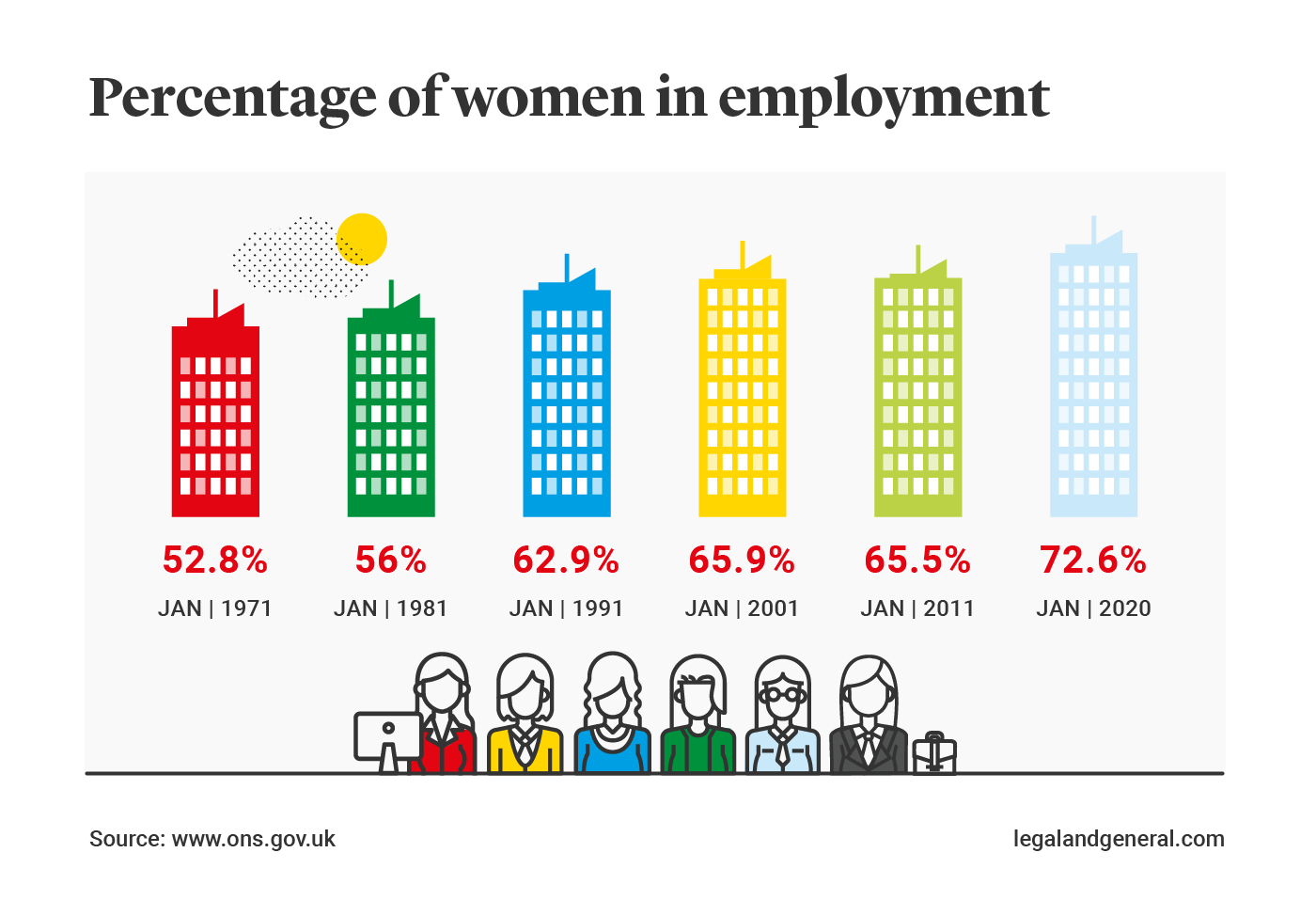
Over the years, the traditional set-up of fathers going to work and mothers raising children has declined, and according to the 2019 British Social Attitudes Survey, people’s opinions have shifted even in recent times. In 2012, 31% of the public thought the best way for a family with a child under school age to organise their life was for the mother to stay at home and the father to work full-time; today, just 19% hold the same view.
Opinions on 'full time' mums and dads
Despite the historic trend against stay-at-home parenting, our survey found that many parents are positive about the idea of being a primary
care giver.
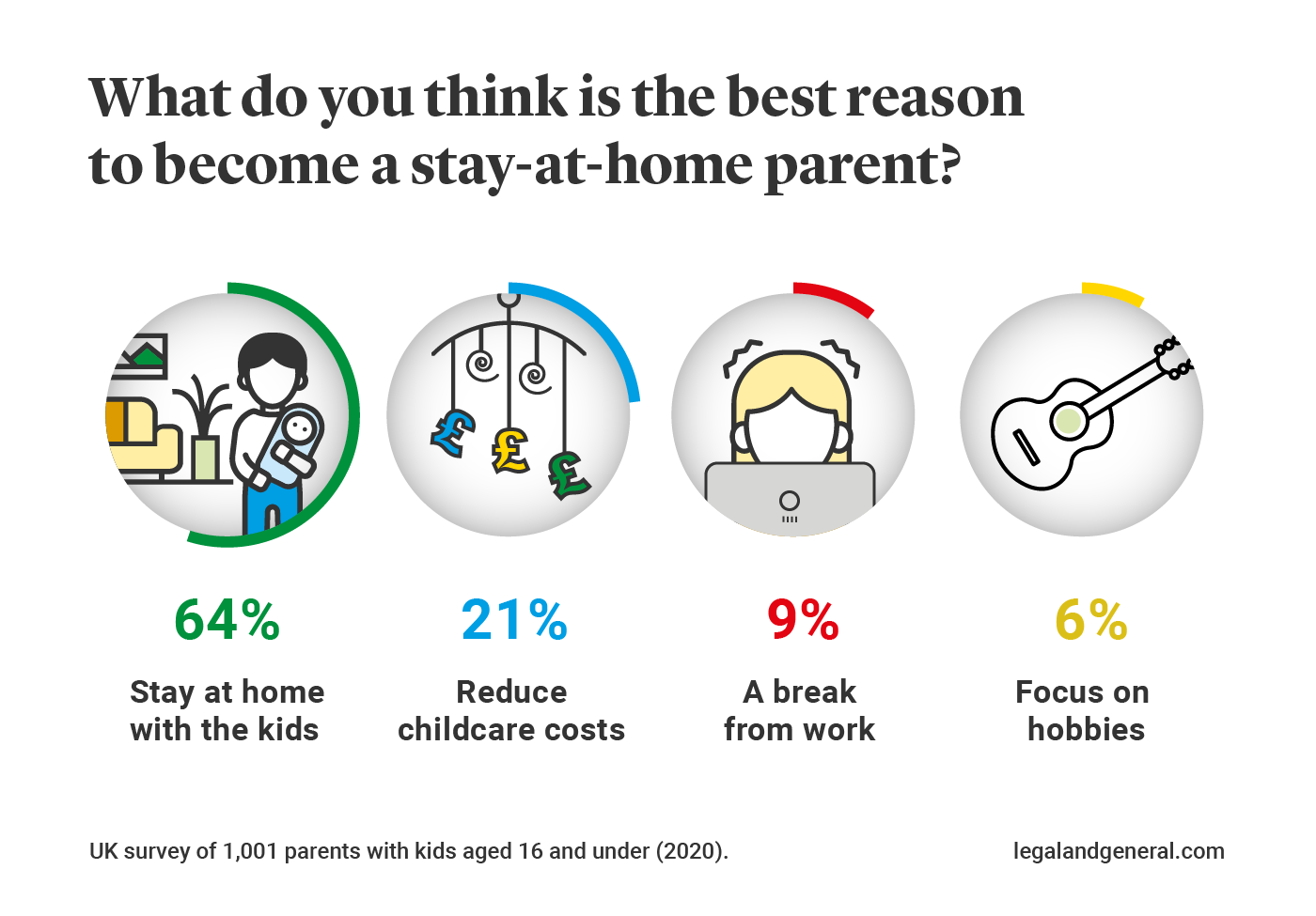
Of those who gave an opinion on which is the best reason to stay at home, spending more time with the kids was the top priority among all parent categories we surveyed – working parents, stay-at-home parents, single parents, separated co-parents, those who are together, same sex and adoptive parents. This was also the top answer regardless of gender, age, work status, location or the age of parents’ children.
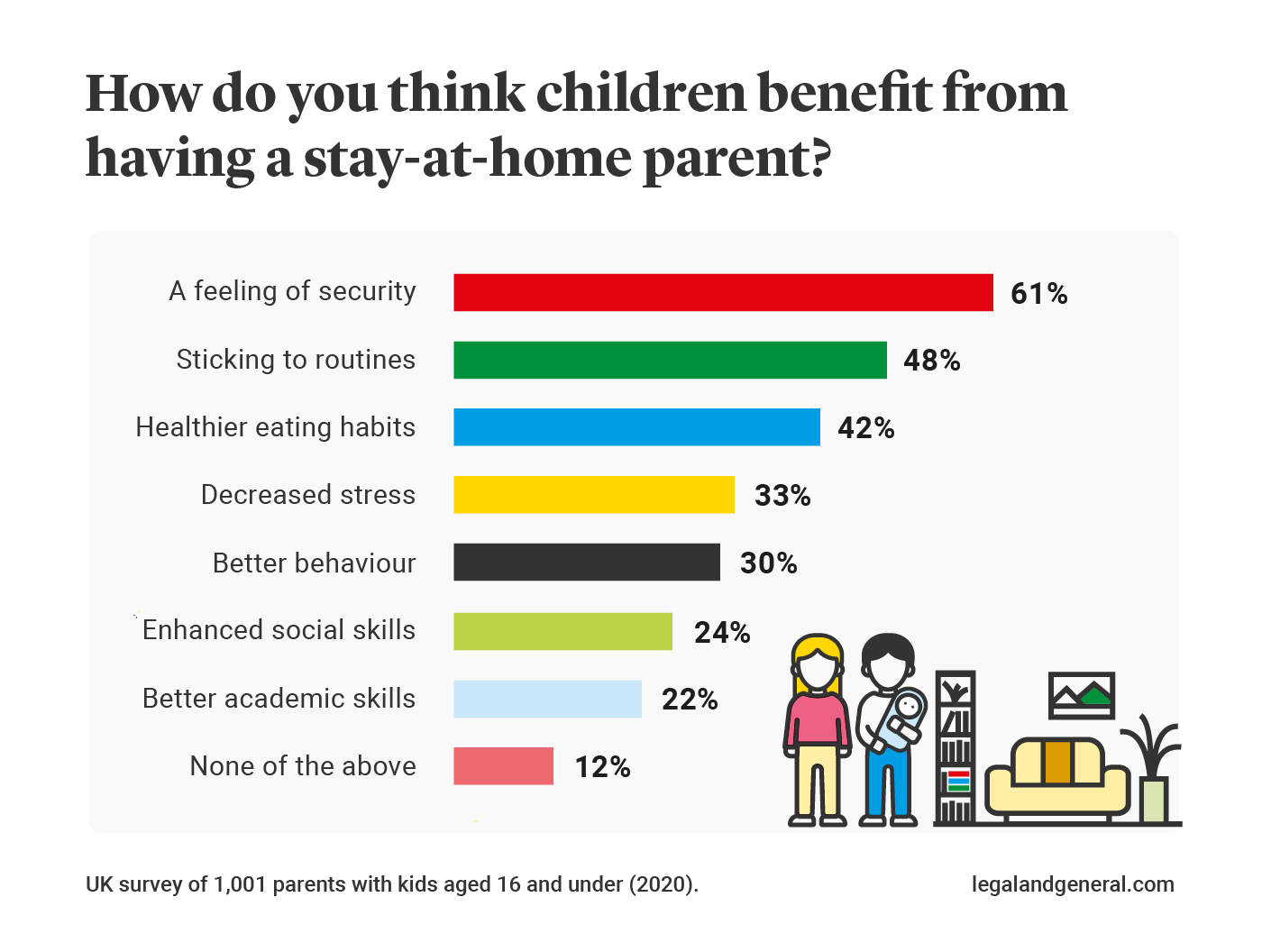
And in terms of views on full-time mums and dads, what’s really been a game-changer in 2020 is the readjustment of family life around the realities of Covid-19. We asked whether lockdown had created more respect for stay-at-home parents, and 65% of parents said yes. This was as high as 74% among parents with children under one, 77% among parents in Northern Ireland, and 81% among same-sex parents. Just as we’ve gained a greater appreciation for the key workers who’ve kept the country running during the pandemic, it seems the stay-at-home parent is once again valued for the sort of work you simply can’t put a price on.
Barriers to becoming a stay-at-home parent
But even if there’s a newfound respect towards full-time parents, that doesn’t necessarily mean working mums and dads are looking to make the leap into stay-at-home parenthood themselves. Our survey suggests that even those who’d like to stay at home to raise the kids are simply unable to do so.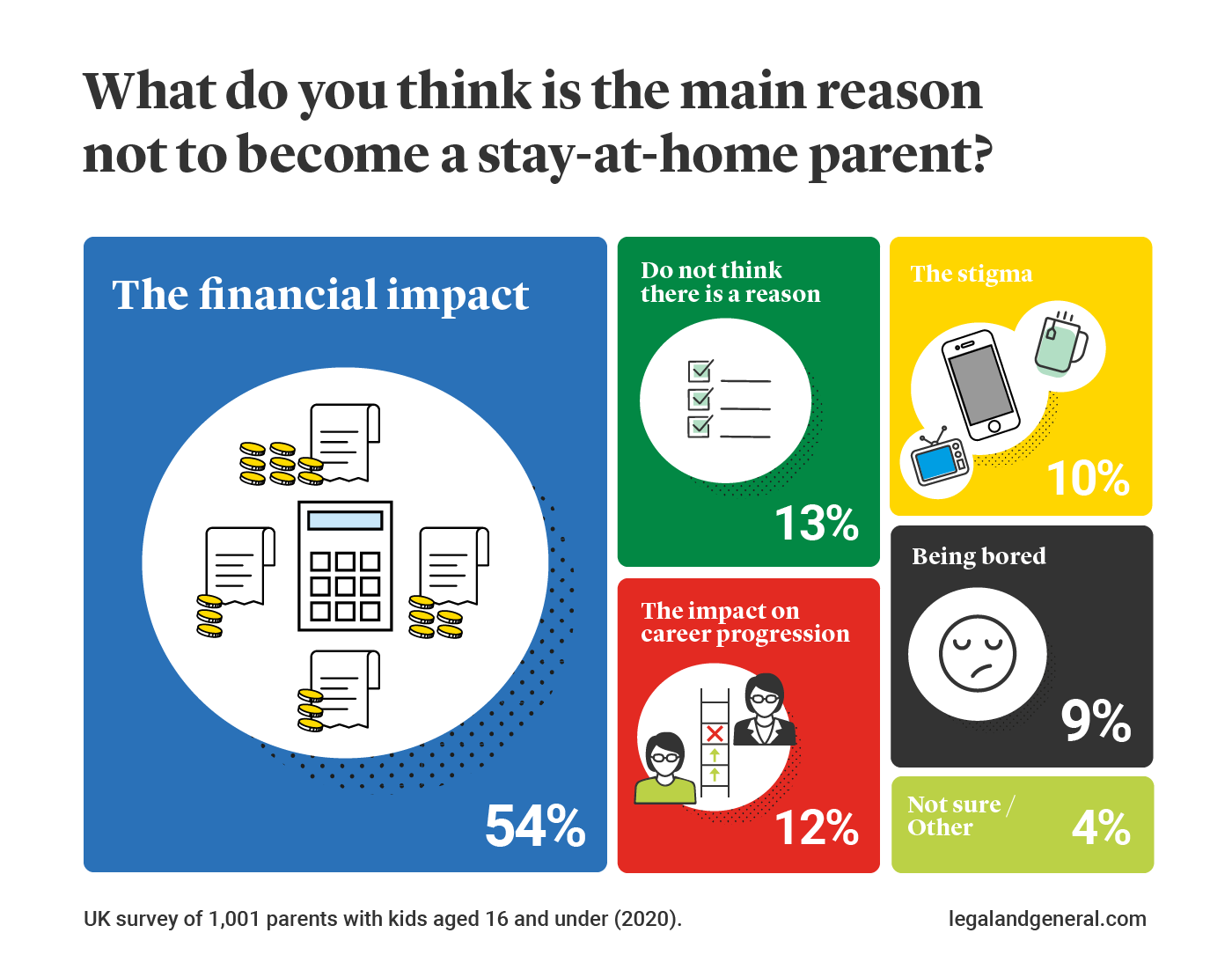
In addition, we found some stark differences in outlook depending on parents’ work-life situation. 60% of working parents said the financial impact was a reason not to become a ‘homemaker’, compared to 38% of stay-at-home parents who answered this way.
For working parents in particular, one of the specific financial bugbears is the cost of childcare. And when you look at the rising childcare costs in recent years, it’s easy to see why:
Childcare Costs 2010-2020
The average weekly cost of a part-time nursery place (25 hours a week) for a child under 2 in the UK.
| £88.00* | 2010 |
| £96.00 | 2011 |
| £102.05 | 2012 |
| £106.38 | 2013 |
| £109.89 | 2014 |
| £115.45 | 2015 |
| £116.77 | 2016 |
| £116.00 | 2017 |
| £122.00 | 2018 |
| £127.00 | 2019 |
| £131.61 | 2020 |
*England regional average
Our survey found that 47% of working parents – the highest across all categories – said that childcare is the biggest source of arguments with their partner. With the costs of childcare rising while many parents try and balance work and family life, it’s little wonder that some parents question whether it’s even worth trying to ‘have it all’ these days.
Moreover, we also looked at whether some of the stigmas surrounding stay-at-home parenthood still exist. Our survey revealed that stay-at-home parents were more likely than working parents to cite stigma as a reason not to become a ‘homemaker’ (17% compared to 10%).
We also wanted to uncover whether the stay-at-home father is an emerging trend. The ‘new man’ concept emerged in the early 1980s to describe men who were accepting of equality in domestic life, and while our survey suggests that men are largely positive about stay-at-home parenthood, it appears that financial pressures are preventing some dads from quitting the day job.
Fathers were marginally more concerned about the financial impact of becoming a stay-at-home parent than mothers, and also, men were more likely to cite ‘break from the stress of my job’ as an actual reason to become a stay-at-home parent. While many companies offer generous paternity schemes these days, Statutory Paternity Leave is a mere 1 or 2 weeks for employees, and most agency and contract workers are ineligible. And though Shared Parental Leave is available to parents, many mums understandably don’t wish to give up their hard-earned maternity leave. Could more be done to support and encourage men to embrace stay-at-home parenthood?
The work from home parent
While we’ve covered the traditional stay-at-home parent, in some ways 2020 and 2021, has seen a version of ‘stay at home’ make a comeback by necessity as much as by design. According to the ONS, 46.6% of the UK workforce were working from home in April 2020 during the coronavirus pandemic, compared to 11% in 2018. Further lockdown restrictions announced in January 2021 have once again seen many children study at home while their parents work. Whatever the future may bring, work from home parenting could be the hybrid model that’s here to stay.
As every stay-at-home parent already knew, getting stuff done while the kids are running around the house is no easy task. We asked working parents how they felt about working from home when their kids are around. 64% of working mums said their kids proved to be a distraction, while Zoom call disturbances were the biggest challenge for 61% of parents of young children aged 6 to 7.
But while working from home while looking after youngsters is no walk in the park, most working parents expressed positive views about WFH parenthood.
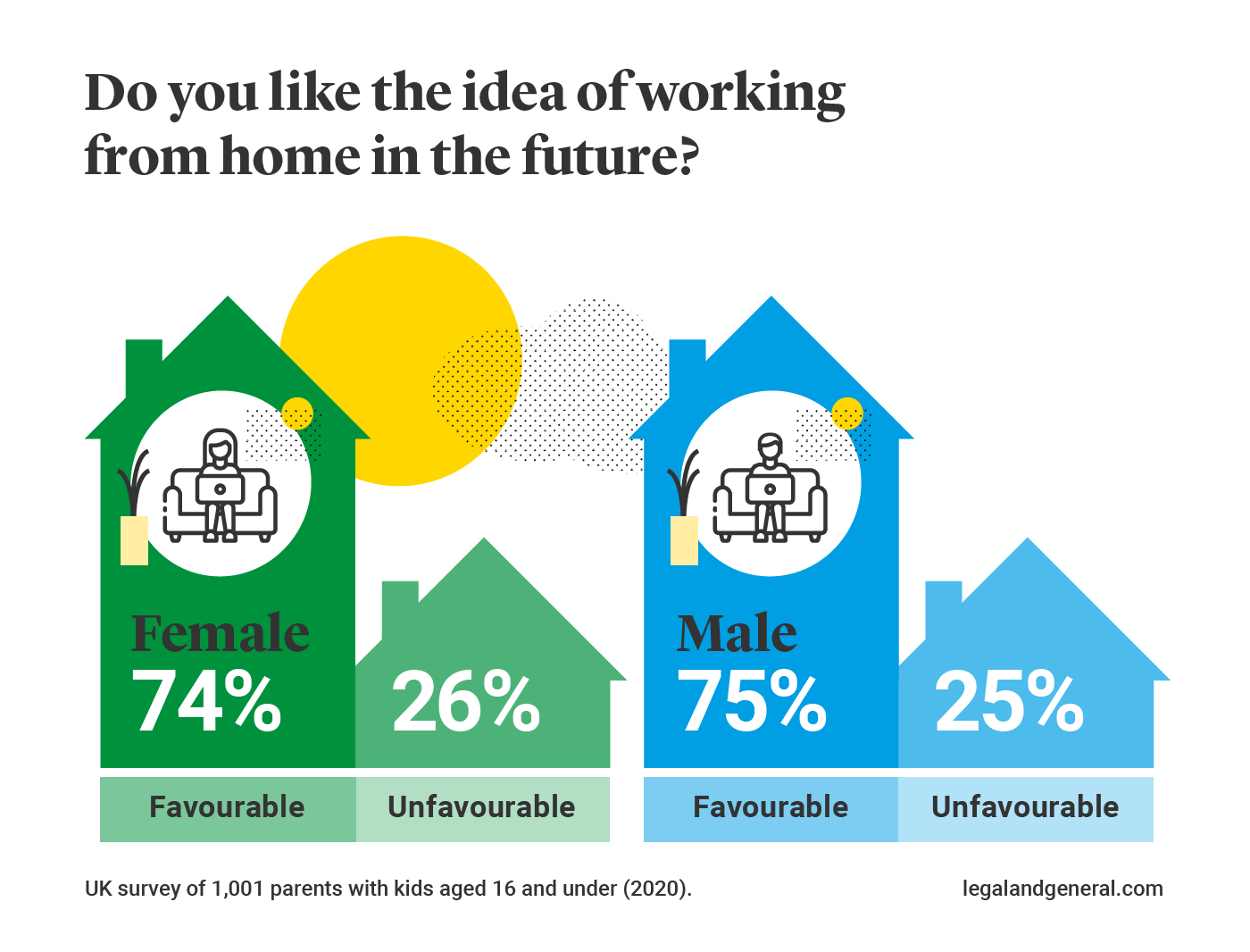
As the graph shows, roughly three-quarters of working parents (men and women) would like to continue working remotely in some capacity.
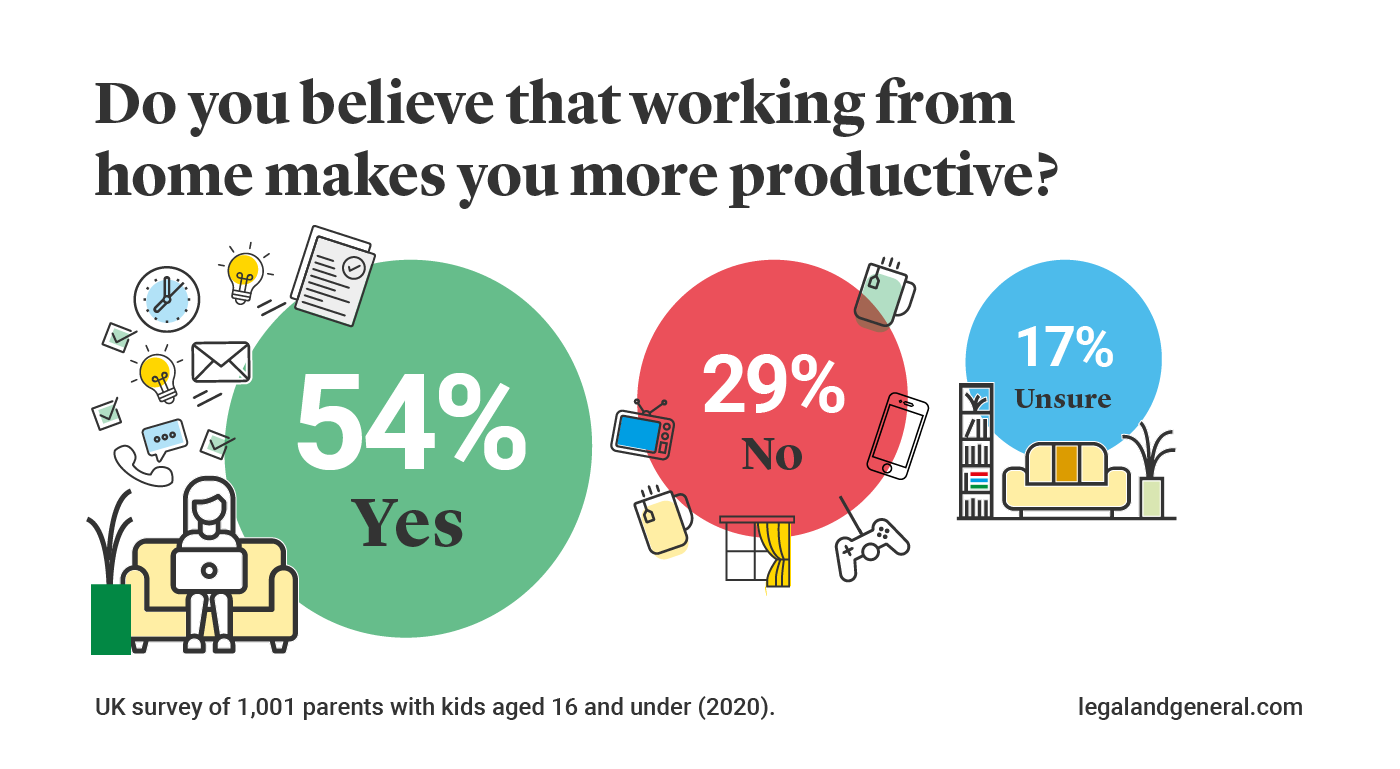
We also saw some regional variation in attitudes towards working from home as a parent. People in the South East are the keenest to get back to their workplace, with 14% saying they would like to return to the office/workplace, whereas 33% of people in Sheffield would like to continue working from home full time – more than any other city.
Home sweet home
There is no perfect answer as to whether stay-at-home or work-from-home is the ideal parenting set-up in the 2020s, but the remote working revolution could have a profound impact on the way mums and dads go about their lives. Many have enjoyed more time to collect the kids from school, increased wellbeing at work, higher productivity and a better balance between work and family life.
Perceptions of parenthood have changed dramatically over the years, and while the numbers of stay-at-home parents have declined for decades, a combination of high living costs, changing attitudes, and the remote working revolution may lead to new, healthier approaches to balancing work commitments and raising children. But of course, to make sure that parenting truly enters the 21st century, we need to cater to the challenges faced by parents – from the cost of childcare to ever-present stigmas – so that everyone can raise their children in the way that works best for their family.
Sources
Article sourced from Home sweet home | Legal & General (legalandgeneral.com)






